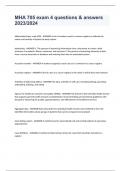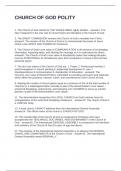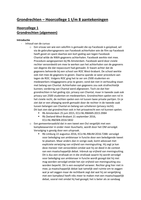Rising Mental Illnesses 100 Years After the Great Depression
More than four in 10 employees say they are more burned out on the job today compared to a
year ago, according to a new survey of 2,800 workers from global staffing firm Robert Half (Mayer,
2021). This survey states that the number of employees who end up in burnout is still growing over
the years. John Maynard Keynes wrote an article in the time of the Great Depression. A time
comparable to today's times, in which society had to live with a pandemic and where many things
changed for people in their daily lives. Not only in their daily lives, but also in the working
atmosphere. The pandemic that has unfolded over the past two years has sent many countries into
crisis. Keynes describes in his book how he believed things had gone wrong before the Great
Depression and what could be done about the economic depression. Therefore, the question: ‘to what
extent did Keynes' predictions come true?’
According to the article of Mayer (2021), burnout keeps building for employees after a year
of pandemic-related anxiety and isolation, heavier workloads, and little to no time off. In times of the
Great Depression, there were a lot of workloads too. Keynes (1930) was convinced in his article that
the great problem of hard-working people will be solved in 100 years after the Great Depression by
the accumulation of capital and by the fast-growing technology that automates production. This
automation will help people to work less hard in the future, according to Keynes (1930). But why is
the number of people suffering from burnout still rising? According to the article of Stiglitz (2008),
Keynes assumes in Economic Opportunities for Our Grandchildren that leisure would increase as
wages and wealth increase is based on the hypothesis that most people is working towards their three
basic needs: food, clothing, and shelter. Keynes is said to have overestimated the value of leisure and
underestimated the value of goods. Some of our increased spendings go to more luxurious ways of
satisfying the same desires that Keynes thought would be fully satisfied.
Another problem the article of Mayer (2021) states is the issue that more than a quarter of
workers say when they do take time off, they check in with work frequently. Keynes (1930)
elaborated in his article on a very different problem. He argues that when people take some time off,
people will become unhappy because people have no idea what to do with their time (Stiglitz, 2008).
According to Stiglitz (2008), Keynes seems to have overestimated the desire for leisure. As
mentioned before, people work harder to meet his or her needs. Needs that seem very innocent to
Keynes but become larger and more luxurious. However, Stiglitz (2008) also states that in some
countries people enjoy more leisure than for instance in the United States. One explanation often put
forward by critics of the European economic model is that taxes discourage work. In Europe, people
pay much more tax on the money earned, which makes taking paid holidays more beneficial for
people. One explanation for why the Burnouts numbers in America are still growing is because people
continue to work much more. And this, in turn, is because taxes on money earned are much less high
(Stiglitz, 2008).
More than four in 10 employees say they are more burned out on the job today compared to a
year ago, according to a new survey of 2,800 workers from global staffing firm Robert Half (Mayer,
2021). This survey states that the number of employees who end up in burnout is still growing over
the years. John Maynard Keynes wrote an article in the time of the Great Depression. A time
comparable to today's times, in which society had to live with a pandemic and where many things
changed for people in their daily lives. Not only in their daily lives, but also in the working
atmosphere. The pandemic that has unfolded over the past two years has sent many countries into
crisis. Keynes describes in his book how he believed things had gone wrong before the Great
Depression and what could be done about the economic depression. Therefore, the question: ‘to what
extent did Keynes' predictions come true?’
According to the article of Mayer (2021), burnout keeps building for employees after a year
of pandemic-related anxiety and isolation, heavier workloads, and little to no time off. In times of the
Great Depression, there were a lot of workloads too. Keynes (1930) was convinced in his article that
the great problem of hard-working people will be solved in 100 years after the Great Depression by
the accumulation of capital and by the fast-growing technology that automates production. This
automation will help people to work less hard in the future, according to Keynes (1930). But why is
the number of people suffering from burnout still rising? According to the article of Stiglitz (2008),
Keynes assumes in Economic Opportunities for Our Grandchildren that leisure would increase as
wages and wealth increase is based on the hypothesis that most people is working towards their three
basic needs: food, clothing, and shelter. Keynes is said to have overestimated the value of leisure and
underestimated the value of goods. Some of our increased spendings go to more luxurious ways of
satisfying the same desires that Keynes thought would be fully satisfied.
Another problem the article of Mayer (2021) states is the issue that more than a quarter of
workers say when they do take time off, they check in with work frequently. Keynes (1930)
elaborated in his article on a very different problem. He argues that when people take some time off,
people will become unhappy because people have no idea what to do with their time (Stiglitz, 2008).
According to Stiglitz (2008), Keynes seems to have overestimated the desire for leisure. As
mentioned before, people work harder to meet his or her needs. Needs that seem very innocent to
Keynes but become larger and more luxurious. However, Stiglitz (2008) also states that in some
countries people enjoy more leisure than for instance in the United States. One explanation often put
forward by critics of the European economic model is that taxes discourage work. In Europe, people
pay much more tax on the money earned, which makes taking paid holidays more beneficial for
people. One explanation for why the Burnouts numbers in America are still growing is because people
continue to work much more. And this, in turn, is because taxes on money earned are much less high
(Stiglitz, 2008).










